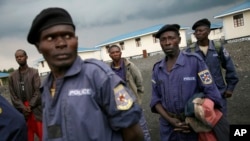The U.N. mission in the Democratic Republic of Congo, MONUSCO, has called on the government to deploy its police force more widely. Currently, only a small number of police officers patrol many of the areas with high crime rates, and a five-year program to reform the police has been found lagging.
During a recent conversation with reporters in Goma, MONUSCO chief Martin Kobler touted the successes in joint army and U.N. operations against rebels. But he stressed the importance of following up on those successes with a permanent police presence.
"We can fight against the armed groups," Kobler said, "but if the state’s authority and the civil administration are not restored, and the PNC [Congo’s national police] are not deployed, the end result will not be a success," he said.
As an example Kobler mentioned Bukaringi territory which he visited recently.
He said the territory with 64,000 inhabitants on 400 square kilometers and had only four police officers, about one officer per every 16,000 people. The normal ratio, he added, is about one for every 500 people.
The latest official figures suggest there are about 100,000 police in the DRC, or approximately one officer for every 700 people nationwide.
Numbers inflated
But Djento Maundu, a former president of civil society groups in North Kivu province, told VOA that figure needs updating.
Perhaps only 60 percent of the names on the police list are of real police, says Maundu, and the rest are out of date or fictitious, although somebody is still drawing their salaries.
There are many territories like Bukaringi, where police presence is minimal, says Swedish academic Maria Eriksson-Baaz, an expert on Congo’s security services.
"In many areas in the east, the police are not simply not present,” she said.
Eriksson-Baaz says you will also see in general in the Congo that there is a great concentration of the PNC in urban areas. You also see that in western parts, she says, but it’s more clear in the east and it’s of course partly due to the security situation. There have been many instances over the years of PNC officers being killed in insecure areas in the east, she adds.
There is a clearly a limit to how far police can protect the population against armed groups.
Lack of training
A government spokesman in South Kivu province, minister Jean Julien Miruho, told a public meeting in Bukavu recently that police had not intervened to prevent a night time massacre at the village of Mutarule last year because they lacked training.
The police, Miruho said, are not trained for warfare, and when there is a lot of shooting as there was that night, it is too much to expect people who are not trained to wage war to intervene at that time.
In more peaceful areas, however, civilians also comment that the PNC are not widely deployed.
A resident of the village of Kibumba, near Goma, told VOA that police are mainly to be found at public buildings such as the offices of local chiefs and administrators, and elsewhere, if you explore the neighborhood, you will not find them.
The governor of South Kivu, Marcellin Chishambo, told the public meeting in Bukavu last month that the PNC is in training, and as it has had to incorporate many former rebels, this training cannot be completed in just two years.
The governor was referring to a five-year reform and training program launched in 2012. One of the main donors, the British development agency DFID, has suspended its funding to the program.




